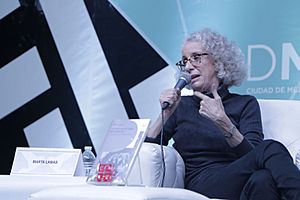Marta Lamas facts for kids
Marta Lamas Encabo (born in 1947) is a Mexican expert in human cultures (an anthropologist) and a professor of political science. She teaches at the National Autonomous University of Mexico (UNAM) and the Instituto Tecnológico Autónomo de México (ITAM). Marta Lamas is a leading voice for women's rights in Mexico. She has written many books to help reduce unfair treatment by talking openly about topics like women's rights, how society sees different genders, and choices about one's body. Since 1990, Lamas has been the editor of Debate Feminista (Feminist Debate), an important magazine about women's issues in Latin America. In 2005, she was even nominated for a Nobel Peace Prize.
Contents
Early Life and Education
Marta Lamas was born in 1947 in Mexico City. Her parents were from Argentina. She studied ethnology, which is the study of different cultures, at the National School of Anthropology and History. Later, she earned a master's degree in anthropology from the National Autonomous University of Mexico.
Sharing Ideas Through Writing
Marta Lamas has played a big role in sharing ideas through writing.
- In 1976, she started a magazine called Fem, which focused on women's issues.
- In 1987, she helped create the first special section for women in a Mexican newspaper, La Jornada. It was called Doble Jornada (Double Day).
- In 1990, she founded Debate Feminista (Feminist Debate). This publication aimed to connect academic ideas about women's rights with the real-life actions of activists. It became one of the most important journals in Latin America because it also included articles written by men.
Lamas was also a founding member of La Jornada newspaper. She writes columns for Proceso magazine and the Spanish newspaper El País. She also writes editorials for El Proceso and Diario Monitor. She has written many books and is known for her strong voice in support of women's rights.
Working for Change
Marta Lamas has been very active in working for social change and women's rights.
- In 1990, she started the Sociedad Mexicana Pro Derechos de la Mujer (Semillas) (The Mexican Society in Favor of the Rights of Women). This group helps women who have fewer opportunities. It supports small businesses and offers help centers and work groups to deal with problems women face, including human rights issues. This organization has grown and now has branches in 24 of Mexico's 31 states.
- In 1992, Lamas also helped create the Grupo de Información en Reproducción Elegida (GIRE) (Information Group on Reproductive Choice). This group shares information about health and rights related to making choices about one's body. They share this information with lawmakers and the media. One of their main goals was to change the discussion from being "for or against" a topic to focusing on "who should decide." Lamas said this was a very important step forward in Mexico.
After 38 years of work by the women's rights movement, led by Ms. Lamas, a big change happened in 2007. The Supreme Court of Justice of the Nation made it legal for women in Mexico City to make certain choices about their bodies early in pregnancy. Lawyers from GIRE helped write the new laws and defended them when people tried to say they were against the constitution. Marta Lamas even spoke during the Supreme Court trial.
Teaching and Training Leaders
Lamas is a political science professor at the National Autonomous University of Mexico (UNAM). She also lectures at the Instituto Tecnológico Autónomo de México (ITAM).
In 2000, she founded the Instituto de Liderazgo Simone de Beauvoir (Simone de Beauvoir Leadership Institute). This is an organization that trains social leaders. Its goal is to help build a democratic society where everyone has rights and freedoms. They do this by sharing knowledge, creating new ideas, and training leaders who care about society and understand different genders and cultures.
Books by Marta Lamas
Marta Lamas has written many important books, including:
- La Bella (in)diferencia (The Beautiful (In)difference), 1991 (in Spanish).
- Para entender el concepto de género (Understanding the Concept of Gender), 1998 (In Spanish).
- Cidadania e feminismo (Citizenship and Feminism), 1999 (in Portuguese).
- Diversidad cultural y tolerancia (Cultural Diversity and Tolerance), 2000 (in Spanish).
- De la identidad a la ciudadanía (The Identity of Citizenship), 2000 (in Spanish).
- Ciudadanía y feminismo: compilación de ensayos aparecidos en "Debate feminista" (Citizenship and Feminism: collection of essays from "Feminist Debate"), 2001 (in Spanish).
- Política y reproducción: ...: la frontera del derecho a decidir (Policy and Reproduction: ...: The Border of the Right to Choose), 2001 (In Spanish).
- Cuerpo: diferencia ... y género (Body: ... Difference and Gender), 2002 (In Spanish).
- El género la construcción cultural de la diferencia ... (The cultural construction of gender difference), 2003 (in Spanish).
- Feminismo: transmisiones y retransmisiones (Feminism: Transmissions and Retransmissions), 2006 (in Spanish).
- Nuevos horizontes de la interrupción legal del embarazo (New Horizons of the Legal Interruption of Pregnancy), 2005 (in Spanish).
- Feminismo (Feminism), 2007 (In Spanish).
- Miradas feministas sobre las mexicanas del siglo XX (Feminist Perspectives on Mexicans of the 20th Century), 2007 (In Spanish).
- Feminism: Transmissions and Retransmissions, 2011 (In English).
- Cuerpo, ... y política (Body, ... and Politics), 2014 (In Spanish).
See also
 In Spanish: Marta Lamas para niños
In Spanish: Marta Lamas para niños


